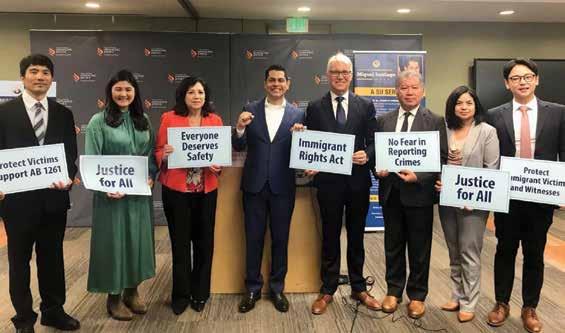
4 minute read
Legislation introduced to protect victims of crime...
victims and witnesses that their livelihoods will not be threatened by coming forward to report a crime. Our collective public safety depends on all Californians feeling safe when they participate in our legal system.
“Californians should not lose their livelihoods simply because they came forward to report a crime,” said Assembly Member Santiago. “With AB 1261, we not only have a chance to reduce crime but also protect some of our most vulnerable community members. All Californians regardless of immigration status deserve to feel safe when participating in our legal system.”
Advertisement
“Far too often undocumented victims of crime and witnesses to crime are afraid to come forward because they are afraid of deportation. Your immigration status should never be a barrier to safety,” Los Angeles County District Attorney George Gascón said. “Public safety for everyone and equal access to the justice system is possible if we protect those that are most vulnerable.
I am proud to sponsor this important piece of legislation. I will always advocate for policies and processes that increase access to justice for the undocumented members of our community while ensuring that people who cause harm are held accountable.”
“Justice, just like the American Dream, should be attainable for all, including our undocumented community members. Unfortunately, they are more likely to be victims and survivors of crime than their citizen counterparts. AB 1261 is a true test of our State’s commitment to justice for all,” said Los Angeles County Supervisor Hilda L. Solis, First
District.
"As an organization that provides legal services to the AAPI community, AJSOCAL encounters undocumented victims seeking help every day. We help victims of domestic violence obtain U Visas and victims of human trafficking obtain T visas, which can be thwarted or unduly delayed if the victim does not get a certification from a law enforcement agency.
AB1261 removes hurdles for undocumented victims of crime who need these certifications and empowers them to come forward for help without the fear of deportation,” said Connie Chung Joe, CEO of Asian Americans Advancing Justice Southern California (AJSOCAL).
"KYCC commends Assemblymember Miguel Santiago on AB 1261 to uplift the most vulnerable members of our community,” said Steve Kang, Director of External Relations for KYCC. “As a leading organization focused on providing free tax prep services for low-income families, we continue to witness the positive contributions of undocumented workers in the growth of our economy. It is time that we provide assistance to our undocumented neighbors who are victims of violence to help facilitate visa applications to ensure justice for all."
"We are happy to see AB 1261, authored by Assemblymember Miguel Santiago and sponsored by Los Angeles County District Attorney George Gascón, going into committee,” said Peter Ng, CEO of Chinatown Service Center. “This is good news and beneficial for the community and especially the API community. The "Immigrant Rights Act" protects undocumented immigrant victims from crimes of domestic violence, and human trafficking. With this bill, victims who help with the investigation can apply for a VISA for them and their family to remain in the country. If you are a victim of such hideous crimes, please do not be afraid to report it, this law can protect you." Often times, undocumented crime victims and witnesses are hesitant to seek assistance from law enforcement for fear of detection. Approximately 83% of the time undocumented folks are victims of a crime, they do not report them. Fears of detection, deportation, and dismissal prevent many undocumented victims to receive justice for the harm they have endured.
AB 1261 would promote California’s goal of protecting our most vulnerable residents by codifying the procedures for S visas and clarifying the procedures for U and T visas.
Assembly Member Miguel Santiago is the Chair of the Assembly Committee on Governmental Organization. He represents the 54th District composed of the cities of Los Angeles, Commerce, Montebello, and Vernon.
Asian Americans Advancing Justice Southern California (AJSOCAL) is the nation’s largest legal and civil rights organization for Asian Americans, Native Hawaiians, and Pacific Islanders (AANHPI). Founded in 1983, AJSOCAL serves more than 15,000 individuals and organizations every year. Through direct services, impact litigation, policy advocacy, leadership development, and capacity building, AJSOCAL focuses on the most vulnerable members of AANHPI communities while building a strong voice for civil rights and social justice. More info is at AJSOCAL.org. g
For uninsured people with cancer...

PAGE 3 coverage, according to Chino, is to qualify for disability through the Social Security Administration, after which they can apply for Medicaid. The federal agency has a lengthy list of criteria for cancer patients. It also has a Compassionate Allowances program, which offers faster reviews for patients with certain serious medical conditions, including advanced or aggressive cancers.
Although the rules vary, many patients don’t qualify until their disease has spread or the cancer requires at least a year of intense treatment, Chino said. That presents an inherent catch-22 for people who are uninsured but have curable types of cancer, she said.
“To qualify for Medicaid, I have to wait for my cancer to be incurable,” she said, “which is very depressing.”
For example, the Compassionate Allowances program doesn’t list basal cell carcinoma, and it covers head and neck cancer only if it has spread elsewhere in the body or can’t be removed surgically.
Adcox said that before her 12-hour operation last June, her financial assistance application with the Medical University of South Carolina was still pending.
Someone from the hospital, she recalled, estimated the bill would be $176,000 and asked how much Adcox could put down. She cobbled together $700 with the help of loved ones.
But she did qualify for financial assistance and hasn’t received any bills, except from an outside lab services provider. “It’s over,” Adcox said. She’s since undergone radiation and will have more reconstructive surgeries.
But she’s cancer-free. “It didn’t kill me. It didn’t kill me.”
Still, not everyone finds a safety net.
Brian Becker, of El Paso, Texas, was uninsured and not working when he learned he had chronic myelogenous leukemia in summer 2021, said Stephanie
Gamboa, his ex-wife and the mother of their young daughter. His cancer physician required an upfront payment, she said, and it took several months to borrow enough money. He started chemotherapy the following year, and over months lost weight and became weaker, returning to the emergency room with infections and worsening kidney function, Gamboa said. The last time their daughter saw her father, “he couldn’t get out of bed. He was literally skin and bones,” Gamboa said. Becker started the process to request disability benefits. The text he sent Gamboa, which she shared with KHN, stated that review of his application began in June 2022 and was expected to take six months.
The denial letter, dated Feb. 4, 2023, arrived more than a month after Becker’s death in December at age 32. It read in part: “Based on a review of your medical conditions, you do not qualify for benefits on this claim.” g






